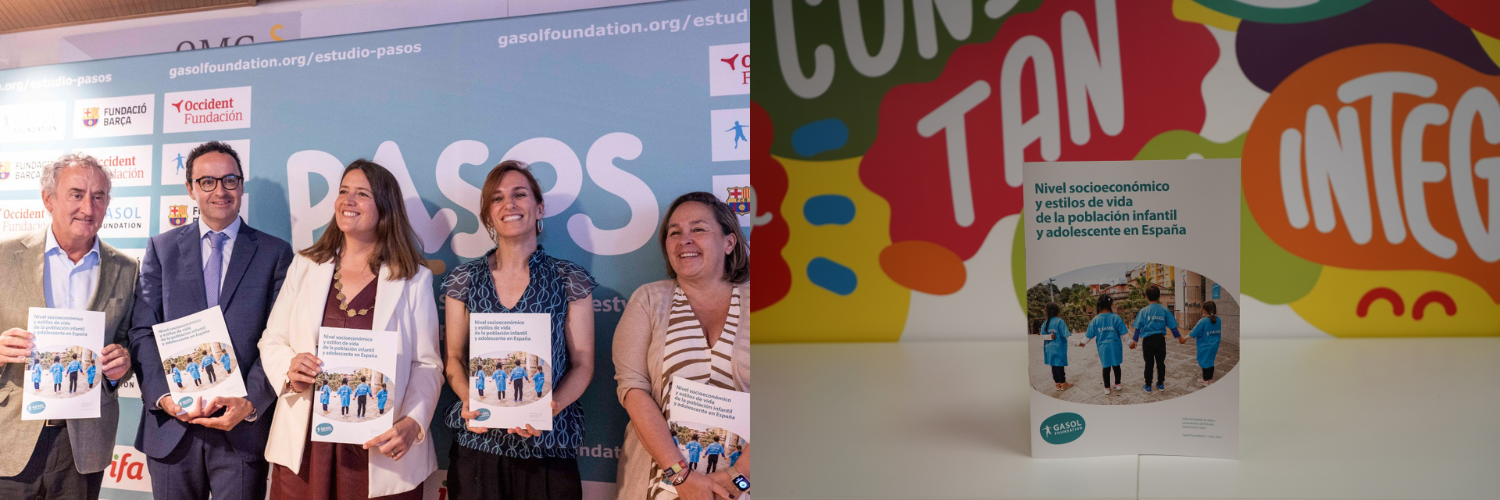2024 in review: Gasol Foundation
Gasol Foundation: Reducing Childhood Obesity and Tackling Socioeconomic Health Inequalities
The foundation was established in 2013 by brothers Pau and Marc Gasol - NBA players and All-Stars - with the goal of reducing childhood obesity rates in both Spain and the U.S. To achieve this, the organization focuses on implementing programs and initiatives that promote healthy habits such as physical activity and sports, healthy eating, sleep, and emotional well-being among children and their families. Over time, it has become a leading entity in advocating for healthy lifestyles and advancing scientific research in the field of childhood obesity.
PASOS Study: Inequalities Report
In July 2024, the Gasol Foundation presented the report Socioeconomic Level and Lifestyles of the Child and Adolescent Population in Spain, based on data from the PASOS study by the Gasol Foundation. This study analyzed the health habits of 3,201 children aged 8 to 16 across Spain and revealed that socioeconomic inequalities result in a significant deterioration of health during childhood and adolescence.
Key Findings from the Report:
Physical Activity: Children from less favorable socioeconomic backgrounds engage in 23 fewer minutes of moderate to vigorous physical activity daily. This translates to over 11 hours per month and nearly 140 hours per year (equivalent to almost six full days).
Screen Time: Children and adolescents in more socioeconomically vulnerable situations spend approximately 16 additional full days per year using screens.
Diet: The percentage of children and adolescents with a low adherence to the Mediterranean diet is 11.5% higher among those exposed to greater socioeconomic inequalities.
Sleep: More than 63% of children and adolescents from more advantaged backgrounds meet sleep recommendations, compared to 14.7% fewer among the most socioeconomically vulnerable.
Psychological Distress: The percentage of children and adolescents reporting feeling worried, sad, or unhappy exceeds 30% across the board and is 2.4% higher among those in lower socioeconomic conditions.
Perceived Health Status: Overall, children and adolescents rated their perceived health at 79.4 points (on a 0–100 scale), a value below the desired level for this age group.
The reality of economic inequalities highlights that the socioeconomic level of families is one of the determining factors of children's lifestyles, and as a result, the lifestyles of those living in more vulnerable environments are more deteriorated.

Abdominal Obesity Puts Over 1 Million Children in Spain at Cardiometabolic Risk
A scientific article from the PASOS consortium, led by the Gasol Foundation and the Hospital del Mar Research Institute, confirms that nearly 60% of overweight children have abdominal obesity.
Key Statistics:
- 56.1% of children aged 8 to 16 with overweight (according to BMI) have excessive fat around the waist, up from 40% two decades ago.
- Abdominal obesity is associated with visceral fat, a condition defining cardiometabolic risk, already affecting more than 1 million minors in Spain.
The PASOS study, led by the Gasol Foundation, continues to contribute to scientific evidence and understanding of childhood obesity issues.
Rising Cardiometabolic Risks in Children
An increasing number of children are at cardiometabolic risk - a set of metabolic and cardiovascular abnormalities predisposing individuals to cardiovascular disease and type 2 diabetes. This is highlighted by the latest scientific article led by the Gasol Foundation and the Hospital del Mar Research Institute. The findings are based on data from the 2019/2020 PASOS study, coordinated by the Gasol Foundation, and the 1998/2000 EnKid study, coordinated by Dr Lluís Serra-Majem, Professor at the University of Las Palmas de Gran Canaria.
Abdominal obesity, understood as the excessive accumulation of fat in the abdominal region, is strongly linked to type 2 diabetes, hypertension, insulin resistance, and dyslipidaemia. These factors make it a clear marker of cardiometabolic risk. According to this study, abdominal obesity among overweight children aged 8 to 16 has risen from 40.7% to 56.1% over the last two decades. This means that in 2019-2020, overweight children (based on BMI) were 99% more likely to have abdominal obesity than in 1998-2000.
Expert Opinions
Dr Helmut Schröder, researcher at the Cardiovascular Risk and Nutrition Group, coordinator of CIBER Epidemiology and Public Health Group 30, and lead author of the article, states:
"The fact that 1 million children currently face cardiometabolic risk highlights the importance of including waist circumference measurement in routine paediatric primary care visits. Beyond BMI, which is commonly assessed in paediatric care to classify children as underweight, healthy weight, overweight, or obese, measuring waist circumference helps determine whether excessive fat is accumulating around the abdomen."
Dr Santi F. Gómez, Global Director of Research and Programmes at the Gasol Foundation and principal investigator of the PASOS study, adds:
"The conclusions from this data are devastating and underscore the need to accelerate the implementation of healthy lifestyle initiatives across all life stages, particularly early childhood, to prevent and comprehensively address childhood obesity. Society as a whole must urgently take action to halt this social and health emergency, which is increasingly affecting more children and leading to more severe consequences, such as cardiometabolic risk."
Study Details
The scientific article, titled "Twenty-year trend of cardiometabolic risk measured by abdominal obesity across body mass index categories in Spanish children and adolescents", has been published in the journal BMC Medicine. The study was based on data from the Gasol Foundation's PASOS study, supported by the FC Barcelona Foundation and Fundación Occidente as main collaborators, as well as IFA, Banco Santander, and Fundación CSAI as health allies.
(The above was extracted and translated from a Press Release by the Gasol Foundation on 19 November 2024)